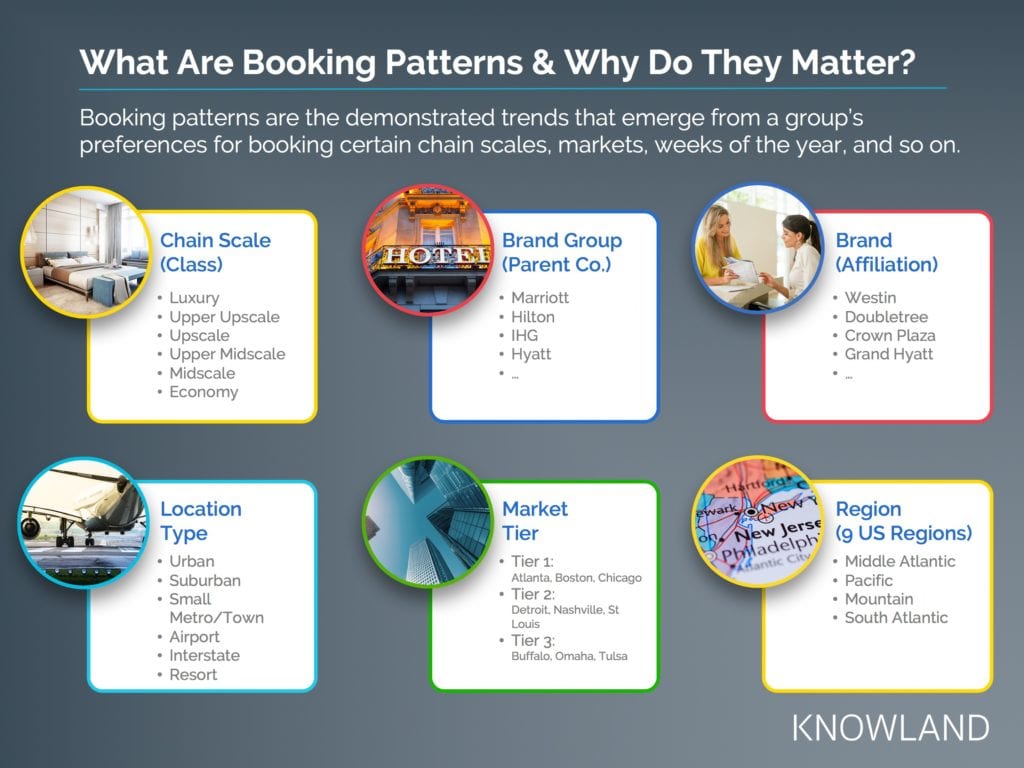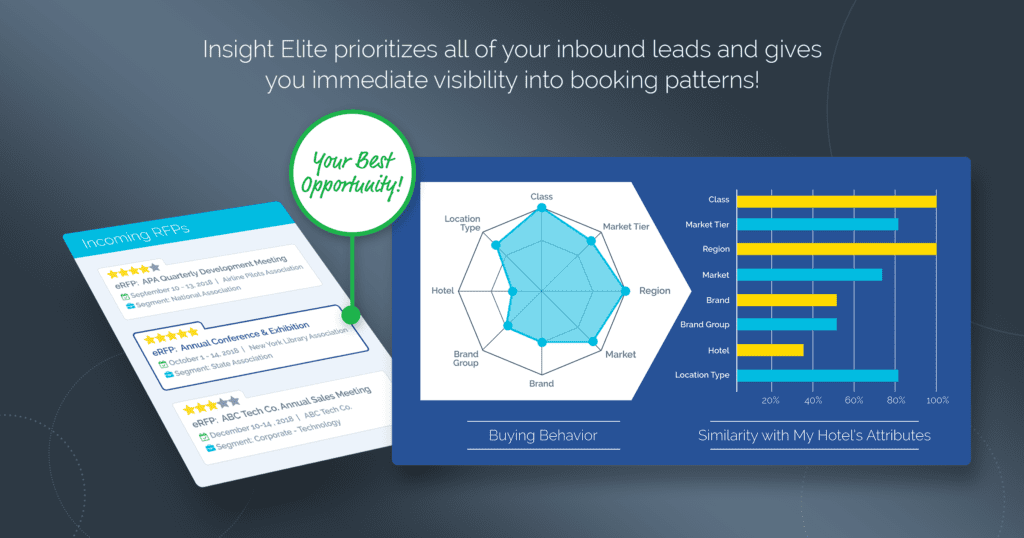Hotel Business Review invited us to contribute an article for this month’s feature on group meetings. We’ve reposted it to our blog and invite you to check out our take on how you can cut through the eRFP clutter to identify the deals that deserve (most of) your attention. We’d love to hear your comments below!
When the first electronic RFP (eRFP) system was introduced back in the mid-90s, it revolutionized the sourcing process for meeting professionals, eliminating hours of manual work to fill out repetitive paperwork, place countless phone calls, and conduct ineffective meetings. The selling and booking process for group business was fundamentally changed forever and the industry rejoiced at how much time would be saved by these promising solutions.
Over the last two decades, eRFP systems have grown increasingly more sophisticated and robust, enabling meeting planners to communicate and distribute their needs to multiple global venues with just a few simple clicks. And with those few simple clicks, a tremendous amount of inefficiency has been reintroduced into the RFP process, triggering hours of work at numerous properties to respond in a timely fashion… including those venues who have little to no chance of winning the business.
Meanwhile, meeting planners find their email and voicemail boxes filling up with a multitude of generic responses from harried sales people, which take time and effort to sort and sift through to find the “one.” Two decades later, the process that was once revolutionized is now in need of another good reboot.
The magnitude of the inefficiencies is staggering when you consider just how many meetings are planned and executed annually. According to a study published by Oxford Economics and the Events Industry Council, 1.9 million meetings are conducted every year in the US alone, generating $325 billion of direct spending. That represents tens of thousands of eRFPs and an exponential number of proposals as meeting planners are oftentimes compelled to seek out multiple bids, and those with less experience sometimes distribute eRFPs to dozens of hotels, regardless of how serious their interest is in any particular one of them.
In a recent survey commissioned by Knowland, 80% of group sales professionals cited eRFPs as a significant lead source, trailing just a few points behind repeat business and inbound calls and emails. However, less than 6% of those sales professionals felt that eRFP leads were “very likely to close” — a very telling indicator of the current state of inbound lead quality and why you often hear sales teams grumbling about eRFP spam.
Compounding frustration on both sides is the time factor. Meeting planners frequently complain about the response times from hotels, while sales professionals oftentimes cite lack of sufficient hours in their day as a key challenge in meeting their sales targets. With an ever-increasing influx of eRFPs to respond to quickly and efficiently as meeting planners click away, what’s a sales director to do?
The answer lies in being able to separate eRFP spam from eRFP gold, enabling you to focus on those eRFPs that are actually a good fit for your property. It turns out that a group’s past booking patterns are a great indicator of what they’ll choose in the future. By analyzing trends in key decision-making areas, you can easily determine where you should and shouldn’t spend your precious time. If your property is not well aligned with a group’s previous booking patterns, it’s probably best to move on quickly to one that is.

So which booking patterns are most influential in a meeting planner’s decision making? Knowland has spent more than a decade analyzing tens of millions of events to try to answer that question. Assuming that your venue can meet a group’s requirements for dates, rates, and size of space, our research indicates that the following areas are most important in predicting whether or not a group is likely to choose your property:
- Chain Scale or Class: Does that group always meet at a midscale property? Does it seem likely that they’d consider a resort or luxury property in a peak market?
- Brand Group Loyalty: Does the meeting planner only book IHG and Marriott properties? Has the group ever convened in a Hilton or independent property?
- Brand Affiliation: How strong is the group’s brand affiliation? Do they explore freely or do they insist on a Grand Hyatt every year?
- Location Type: Does the group prefer urban or suburban environments? Do they always meet next to a large airport or a theme park?
- Market Tier: Does the meeting planner lean towards Tier 3 markets like Buffalo, Omaha, or Tulsa? What’s the likelihood of selecting a Tier 1 like Boston or Chicago?
- Region: How frequently has the group met your region? Do they always meet on the west coast or do they sometimes also opt for the mid-Atlantic states?
- Specific Market/City: Does the group like to city-hop? Or is it just a toss up between Vegas and Orlando every year?
- Hotel: Has the group ever met in your hotel? How consistent are they with their hotel choices in general?
Comparing your property’s attributes to these core booking behaviors can tell you where to focus your sales efforts and which eRFPs should be at the top of your list. Oftentimes, this data is housed in sales databases or available to teams in third-party tools, but isn’t effectively harnessed by sales teams in their daily activities and lead management processes. By training sales directors and managers to incorporate this type of analysis into their standard procedures, you can improve your close rates and reduce your customer acquisition costs.
Once eRFPs are prioritized, insights into booking patterns can further enhance your ability to win more deals by enabling you to customize proposals specifically for the prospect at hand. When queried, the vast majority of meeting planners state a preference for hotels that customize their proposals, rather than those that deliver generic, rubber-stamped responses.
In a sea of other properties vying for a particular piece of business and a crowd of sales people delivering generic proposals, there’s a tremendous opportunity to stand out as a top contender by tailoring a pitch to address a prospect’s unique booking patterns, including overcoming challenges in weaker areas before they even surface. For example, maybe a meeting planner has never met in your city before, but is a solid match on a number of other criteria. Highlight the benefits your city has to offer, why meeting attendees might enjoy a change of venue, how much more affordable the travel costs would be, or how special events happening simultaneously in your city could enhance their meeting experience.
Understanding an account’s overall booking behaviors even enables you to turn inbound leads that don’t match your rates, dates, and space available into an opportunity. It gives you the chance to start meaningful conversations with meeting planners that can lead to additional group business and future events that are a great fit for you. By showing that you have a thorough understanding of the organization’s overall event calendar, their needs, and their preferences, you can proactively pitch for that future business next August in the midwest that typically gets booked in a luxury venue just like yours.
Booking patterns empower you to personalize your eRFP responses, to develop stronger customer relationships, and to improve your conversion rates. And, by prioritizing the eRFPs that have the highest match rates with your property, you’ll have the time to craft personalized pitches and develop deeper conversations. By leveraging the right data, you can finally reclaim the elusive efficiency the eRFP process once promised — and outsell your competition.
Ready to get started? See how Knowland can help you prioritize all of your inbound leads (and optimize outbound activities, too!)

Knowland delivers immediate visibility into the booking patterns that matter most, and even analyzes how well your property stacks up to give you valuable insight into the likelihood of winning the deal. Additionally, Elite serves up the deep account insights you need to craft the perfect pitches that give you a competitive edge. We invite you to explore Knowland using the button below or request a demo here ›
| LEARN MORE ABOUT ELITE › |
![]()
